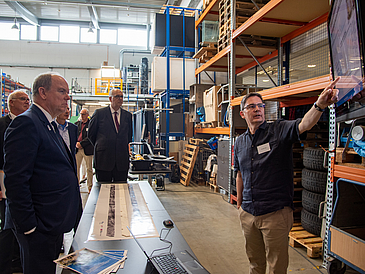The University of Bremen is the largest university location for marine research in Germany, encompassing a wide range of disciplines and cooperating closely with many partner institutions in the region. During the tour, researchers from the university presented a cross section of their work to Prince Albert. For example, scientists are studying cold-water corals, a particularly fragile ecosystem in the deep sea, as well as hydrothermal and cold springs, which are unique oases of life at depths of several thousand meters.
University of Bremen: Important Location for Marine Research
In addition to biodiversity studies and background information on climate change and climate archives, methods for removing carbon dioxide from the atmosphere are to be further developed at the University of Bremen in the future. To this end, biological as well as geoscientific methods are being worked on within the framework of the German Alliance for Marine Research.
Prince Albert II, who is committed to the protection of the oceans as well as sustainability, expressed how impressed he was by the professional breadth of the research content as well as the infrastructure at the University of Bremen. The University of Bremen and MARUM in particular are very good examples of how research can succeed in protecting the environment and achieving greater sustainability.
According to Bremen’s mayor Andreas Bovenschulte, who accompanied the prince during his visit to Bremen, the work at MARUM and the University of Bremen demonstrates the importance of marine research at the location. “Even difficult issues are tackled here without hesitation.”
About the 15th International Coral Reef Symposium
More than 1,000 scientists from over 80 countries are attending the world’s most important event for coral reefs starting this weekend in Bremen. Host of the 15th International Coral Reef Symposium is the University of Bremen.
Further Information:
https://www.uni-bremen.de/forschung/forschungsprofil/wissenschaftsschwerpunkte

